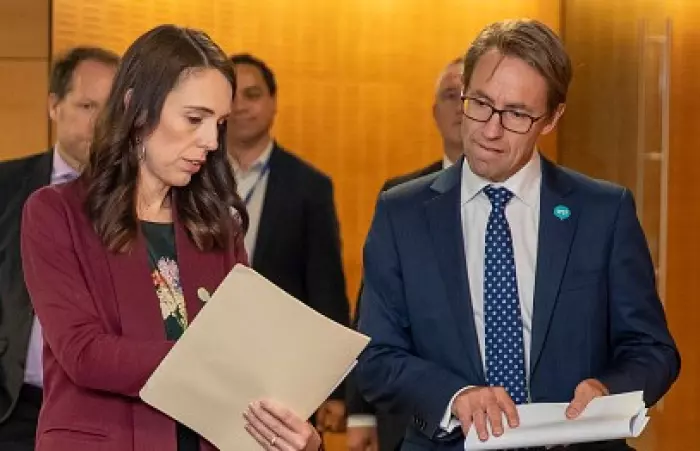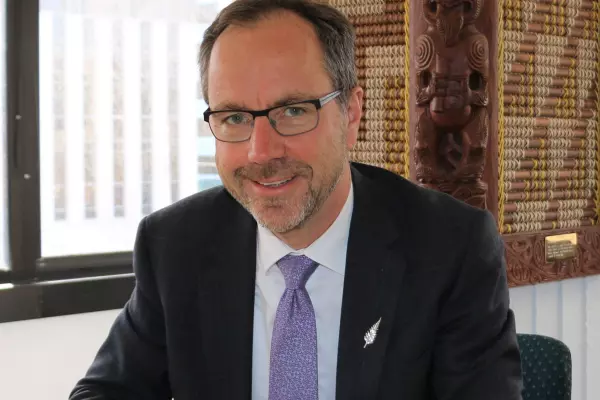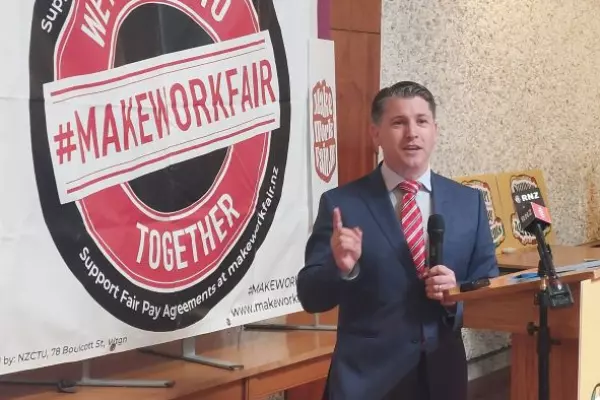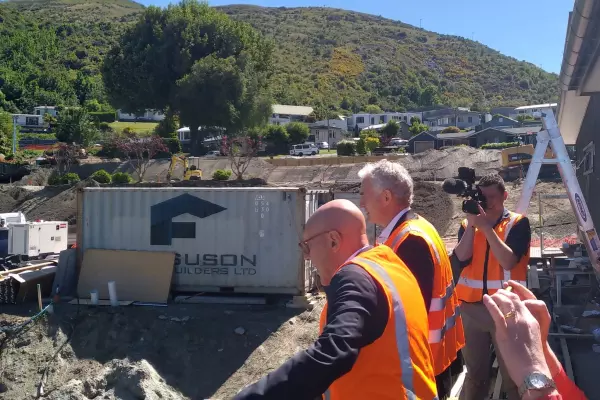Book review: “Policymaking under pressure”
Stand by for a shocking revelation: politics sometimes gets in the way of good policy.
Okay, that’s not so surprising. But the new volume Policy-making Under Pressure from Canterbury University Press offers true-life accounts of how politics and myriad other constraints stand between bad problems and good solutions.
The “pressures” of the title are many. They’re documented with dozens of case histories from the book’s authors, evenly distributed among politicians, public servants and academics.
Politics essential but risky
The interface between politics and the public service is “the main thing that makes public policy hard”, writes Anneliese Parkin who, as deputy chief executive, is in charge of policy in the Department of Prime Minister and Cabinet.
Ministers’ need to sift advice through a political lens “is sometimes lost on newer analysts, who cannot understand why ministers take decisions that are not in line with evidence”, she says.
In the extreme, for ministers it is sometimes “good politics not to find out that the policy the party campaigned on is ineffectual or poor value for money”, Parkin says. That is a dangerous dynamic, according to other authors.
Former cabinet minister and Labour leader David Cunliffe says the essential Westminster tradition of free and frank advice – public servants’ duty to give their best advice “even if the answer is not what the minister wants to hear” – is under threat in NZ. He encourages ministers to accept they’re better to hear about policy flaws “in the privacy of officials’ briefings rather than via the media”.
Peter Gluckman, a former chief science adviser to four prime ministers, says some ministers are open-minded, but some try to dominate their officials. Some officials, meanwhile, “are subservient and are highly risk-averse, others stand up for independence and will give frank advice … There is a danger in this chemistry that access and information can become unduly filtered”, Gluckman says.
Public servants can face adverse incentives in giving their best advice. “The worst thing that can happen to your career as a policy leader is that you lose your minister’s trust,” Parkin says. “It is difficult to convince your chief executive that you’re doing a great job if your minister is refusing to meet with you.
“The temptation then for senior policy practitioners is to be (overly) amenable to the minister’s priorities and preferences. In the short term that makes for an easy life all round. It doesn’t generally make for good policy advice, though.”
 Gluckman: "Information can become unduly filtered." (Image: University of Auckland)
Gluckman: "Information can become unduly filtered." (Image: University of Auckland)The Beehive’s “political advisers” are a complicating factor. They both manage the flow of papers to ministers and, according to Cunliffe, sometimes “suppress healthy evidence-based debate”. Gluckman warns that “many [political advisors are] relatively young and with political ambitions of their own”.
Parkin says political advisers can ensure that ministers hear voices from outside the public service, and help move policy forward despite distracted ministers who “spend less time on policy development than perhaps people imagine".
"Tension creeps in only with those ministerial advisers who are too inexperienced to understand that they are not the minister.”
Public servants support MMP coalitions
Chief among the Beehive’s political advisors is the prime minister’s chief of staff. In Policy-making under Pressure, Wayne Eagleson, chief of staff to three National prime ministers, details the importance of this role in managing complex MMP coalitions.
“Managing so the prime minister can lead”, as he describes the role, turns out to be complex. As chief of staff, he helped prepare the confidence and supply agreements that held together successive National coalitions with Act, the Māori Party and United Future.
Then, by Eagleson’s account, he helped in real-time to broker arrangements that kept the wheels from flying off – associate ministers from a minor partner being bound by collective responsibility only for their own policy delegations, for example.
Peter Dunne, the former United Future leader who served as a minister in multiple coalition governments, credits officials from the core public service with helping to keep MMP coalitions together.
Dunne shared tax policy decisions with finance ministers Michael Cullen and Bill English in Labour- and National-led coalitions respectively. Inland Revenue and the Treasury worked with their own ministers to formulate proposals that met the needs of each.
“That advice would then be finessed into the joint advice that would go to both ministers to shape our decisions,” Dunne recalls.
He adds that sometimes “officials seemed to be more adventurous in their advice on policy issues when they were reporting to a minister who was not from the major party of government” because of a sense that “some of the previous policy constraints did not apply”.
Stuck in silos again
Multiple authors in Policy-making Under Pressure lament the difficulty of getting joined-up thinking across agencies.
“Coordination is a challenge that no jurisdiction has fully resolved,” offers public service commissioner Peter Hughes.
“Coordinating across departments without stifling innovation has been described as the ‘philosopher’s stone’ and the ‘holy grail’ of public administration.”
By today’s analysis, much of the problem comes from the state sector reforms of the late 1980s and early 1990s, which strengthened chief executives’ accountabilities to their ministers, and gave them more autonomy to run their agencies.
By contrast, the Public Service Act provides for a host of cross-agency structures with accountability to the “whole of government” instead of individual ministers.
Former education minister Nikki Kaye supports such changes, but doubts they’ll be enough.
“What is required is a major cultural shift in political thinking and policy-making to enable us to embrace the complex systems and reality of policy areas such as education," she writes.
Antici … pation
It’s hard enough dealing with the complex immediate and visible problems, but what about the slow-moving crises that are hard to see?
Are ministers' and public servants' incentives right to anticipate the hardest problems and engage in long-term strategies to prevent or solve them?
As Parkin says, “governments simply can’t spend too long on the policy development stage or they will get nothing implemented in time to show results before they have to start campaigning again”. It's easier to look the other way than to take risks preventing problems that will be some other government's problem in a few years time.
Thus, perhaps, why successive governments have prepared so poorly on problems like water quality, child poverty, incarceration rates, obesity and diabetes, climate change and disaster preparedness.
English sees another problem with the public sector’s incentives: “public agencies are eternal monopolies” with no existential threat unless they violate the Public Finance Act. “Without the presence of external risk, the public service does only what it is motivated to do, and sometimes what politicians demand it does.”
There are some moves to force longer-term thinking. The new Public Service Act requires the core agencies to step back and produce regular “long term insights briefings” free of political influence. The law requires the government itself to respond to the recommendations of the Climate Change Commission. Similarly, the Child Poverty Reduction Act mandates that governments focus on that seemingly intractable issue and transparently report progress or otherwise.
Treaty? What Treaty?
Policy-making Under Pressure would benefit from more attention to Te Tiriti o Waitangi. An early chapter from Lisa Tumahai (kaiwhakahaere of Ngāi Tahu and deputy chair of the Climate Change Commission) outlines the challenge of “embedding rangatiratanga into the policy-making process”.
In real life, agencies throughout Wellington crave but are struggling to acquire the knowledge, skills and connections to meet expectations that Te Tiriti will move closer to the centre of policymaking.
Such challenges are not considered deeply in this book – a deficit the editors acknowledge in their final essay.
What next?
Policy-making Under Pressure’s various authors propose many approaches to improve policymaking.
Cunliffe calls for a different form of government – an “adaptive state” that is clearer on when and where markets are working well, when they need to be regulated, and when markets need to be taken over by governments.
Cunliffe acknowledges this will require “a reset of ambition and tolerance for failure” that “represents a real challenge” for Westminster-style democracies that are used to incremental change and consensus.
English advocates for embedding “feedback thinking” into policy. This requires targets of the sort embedded in the climate change and child poverty legislation, or of the sort that emerged last year during the daily 1pm covid-19 briefings. It then requires Parliament, ministers and public servants to change their habit of “resistance to the particularity and accountability that come with numbers and data”, he says.
Reforms both radical and more mundane are proposed by the volume's editors, Sonia Mazey and Jeremy Richardson, who are both adjunct professors at Canterbury University.
Extending the electoral cycle beyond three years would help address the short-termism of politicians and enable policy to be developed over a longer cycle. Mazey and Richardson propose five years between elections.
Citing best practices from Sweden, they would like to see more policy-leading bodies such as the Climate Change Commission. Done properly, this approach can enable cross-party consensus among politicians for proposals that are “non-partisan and evidence-based”.
More radically, Mazey and Richardson propose that Cabinet ministers might be appointed from outside Parliament. Parties select candidates “only rarely for their policy expertise” or management ability. As an alternative to this “rather strange way to recruit people to govern the country”, prime ministers might like access to a larger talent pool for their ministerial appointments.
Under another proposal, “individual government departments would lose their exclusive recruitment function for policy-related grades and the careers of successful entrants would be managed centrally”. This would replace the current “market system” by which advisors advance their careers by agency-hopping.
True stories
This volume contains its fair share of academic treatises. But the memorable and engaging bits are the personal accounts from the practitioners – politicians and public servants.
 Dalziel: Local knowledge not valued in Wellington (Image: Christchurch City Council)
Dalziel: Local knowledge not valued in Wellington (Image: Christchurch City Council)Dunne speaks warmly of the importance of longstanding, trusting relationships between officials and politicians.
Gluckman recalls an incident when “a clear bias was revealed by officials in their policy advice which was both in contradiction to the evidence and expressed a clear ideological position in conflict with the government.”
A senior minister stepped in after noticing that the paper also claimed support of the government’s science advisors, which “on investigation … turned out not to be the case”.
Christchurch mayor and former Labour cabinet minister Lianne Dalziel dissects policy failures. She also laments the central government’s lack of respect for local knowledge. She experienced this after the Christchurch earthquakes, feeling that her insights were ignored because she was an opposition MP – and again as mayor of Christchurch with local government’s knowledge being undervalued by Wellington.
There’s plenty of theory in Policy-making Under Pressure, but the true tales are the stories that stick.
Policy-making Under Pressure: Rethinking the policy process in Aotearoa New Zealand, edited by Sonia Mazey and Jeremy Richardson, Canterbury University Press, November 2021, $49.99, ISBN 978-1-98-850324-0.














